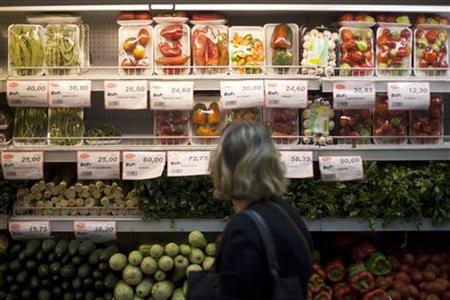
A woman looks for her groceries at a supermarket in Caracas (Reuters)
MILAN (Reuters) – Global food prices hit a record high in February, the United Nations said on Thursday, warning that surprise oil price spikes induced by Middle East unrest would impact already volatile cereal markets.
Rising food prices are a fast-growing global concern, partly fuelling the protests which toppled the rulers of Tunisia and Egypt in January and February, which in turn unleashed unrest in North Africa and the Middle East from Algeria to Yemen.
The U.N. Food and Agriculture Organisation’s Food Price Index hit its second straight record last month, further passing peaks seen in 2008 when prices sparked riots in several countries, driven by rising grain costs and tighter supply.
David Hallam, Director of FAO’s Trade and Market Division said further jumps in the oil price could have an impact on food markets, which have seen benchmark U.S. wheat prices surge 60 percent in the year to March.
“Unexpected oil price spikes could further exacerbate an already precarious situation in food markets,” Hallam, said in a statement.
Oil prices recently hit 2-1/2 year highs, nearing records set in 2008, with markets spooked on concern that North African and Middle East unrest would choke key supplies.
Farmers depend on fuel to run agricultural machinery, while dry bulk shippers are heavy oil users, costs which are passed on to food buyers.
Spiralling shipping costs for commodities threaten to drive food inflation even higher as nations from Asia to the Middle East and Africa scramble for supplies, analysts say.
The FAO, which measures monthly price changes for a food basket composed of cereals, oilseeds, dairy, meat and sugar, averaged 236 points in February, the record in real and nominal terms, up 2.2 percent from January’s record and rising for the eighth month in a row.
The Rome-based FAO has said global supply of main agricultural commodities would remain tight until new harvests in key producing countries and warned food prices could climb even higher.
FAO said in Thursday’s statement it expected a tightening of the global cereal supply and demand balance in 2010/11.
“In the face of growing demand and a decline in world cereal production in 2010, global cereal stocks this year are expected to fall sharply because of a decline in inventories of wheat and coarse grains, ” the agency said.
FAO said it forecasts global wheat production to increase by around 3 percent in 2011.
(Writing by Keiron Henderson; editing by Veronica Brown)
By Svetlana Kovalyova
MILAN | Thu Mar 3, 2011 10:40am GMT
Source: Reuters